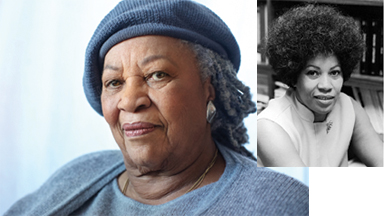By Nicholas Sakelarisund
Aug. 6 (UPI) — Author Toni Morrison, the first African American to win the Nobel Prize for literature, died Monday at a New York hospital at age 88.
She is best known for works including Beloved, Tar Baby, Song of Solomon, Sula and The Bluest Eye. Morrison was a professor at Yale and Princeton universities. In 2012, President Barack Obama award-ed her the Presidential Medal of Freedom.
“It is with profound sadness we share that, following a short illness, our adored mother and grandmother, Toni Morrison, passed away peacefully last night surrounded by family and friends,” the family said in a statement. “She was an extremely devoted mother, grandmother and aunt who reveled in being with her family and friends. The consummate writer who treasured the written word, whether her own, her students’ or others’, she read voraciously and was most at home when writing. Although her passing represents a tremendous loss, we are grateful she had a long, well-lived life.”
Morrison became the first African American woman to win the Nobel Prize in literature in 1993. She was also the first U.S.-born author to win since John Steinbeck in 1962. At the time, she said she was “profoundly honored” to win the award.
“The most meaningful thing to me personally is that at last the prize has been awarded to an African American,” Morrison said in 1993. “I thank God my mother is alive to see this day.”
Four of her novels made Oprah Winfrey’s book club.
Morrison’s work detailed Black life in the United States from slavery to the fight for equality. The 1987 novel Be-loved won a Pulitzer Prize and was later made into a movie starring Winfrey. The main character is Sethe, a slave mother who murdered her child rather than let her live in slavery. She’s haunted by her decision that slavery is worse than no life at all.
Her 1970 novel, The Bluest Eye, became an enduring classic. The character, Pecola Breedlove, is a poor 11-year-old girl who believes she is ugly and starts to hate herself.
“She had seen this little girl all of her life. Hair uncombed, dresses falling apart, shoes untied and caked with dirt,” the book describes Pecola. “They had stared at her with great uncomprehending eyes. Eyes that questioned nothing and asked everything. Unblinking and unabashed, they stared up at her. The end of the world lay in their eyes, and the beginning and all the waste in between.”
Morrison taught English and the humanities at Texas Southern University for two years before moving to Howard University in Washington, D.C. She went on to have various teaching positions at Yale, Bard College, Rutgers University and Princeton.
She also served as the author of a book of essays called Raceing Justice, EnGendering Power that described Supreme Court Justice Clarence Thomas’ nomination hearing when law professor Anita Hill accused him of sexual harassment.
Morrison served as the co-chair of the Schomburg Commission for the Preservation of Black Culture and was a member of Africa Watch and the Helsinki Watch Committees of Human Rights Watch.
She was always proud to be a Black, female author.
“I really think the range of emotions and perceptions I have had access to as a black person and as a female person are greater than those of people who are neither,” Morrison said. “So it seems to me that my world did not shrink because I was a ‘black female’ writer. It just got bigger.”

